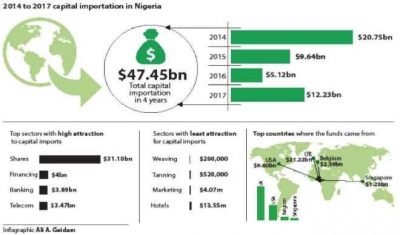Shares, banking, others attracted $47.45bn forex in 4yrs
Shares, financing and banking were the three top economic activities that attracted the bulk of the $47.45 billion foreign exchange inflow to Nigeria in the last four years.
Data from the National Bureau of Statistics (NBS) show that in 2014, Nigeria recorded a total of $20.75bn as foreign exchange inflow into the country for loans, investments and capital, but these inflows dropped to $9.64bn and $5.12bn in 2015 and 2016 respectively largely due to downturns in Nigeria’s economy.
As Nigeria recovered from recession in 2017, capital importation doubled to $12.23bn from the $5.12bn recorded the previous year.
Daily Trust analysis shows that from 2014 to 2017, Nigeria recorded a total of $47.45bn foreign exchange inflows that went into shares, financing, banking, oil and gas, as well as the construction and services sectors of the economy.
Sectorial analysis of the destinations of these foreign exchange shows that in the last four years, shares attracted the highest foreign exchange which totalled $31.10bn and this was followed at a distance by financing, which attracted about $4bn.
Banking, telecommunication and production attracted $3.89bn, $3.47bn, $3.16bn respectively from 2014 to 2017, while services, oil and gas and trading attracted $2.73bn, $1.39bn and $738.98m within the same period.
Daily Trust observed that weaving, tanning, marketing, hotels, transport and information and technology services were among the economic activities that attracted the least investments from abroad from 2014 to 2017.
Within the period, weaving, tanning and marketing attracted $200,000, $520,000, and $4.07 million respectively, while hotels, transport and information and technology services attracted investments worth $13.55m, $18.19m and $47.98m.
Other critical sectors of the economy that attracted investment included agriculture, construction and electrical sub-sector to the tune of $ 340.77m, $217.04m and $324.25m.
Further data analysis of the countries where these foreign exchange remittances into Nigeria originated from showed that most of the inflows were from outside the African continent.
From 2014 to 2017, the United Kingdom (UK), United States of America (USA), Belgium and Singapore accounted for the bulk of Nigeria’s capital importation.
Within the period, UK and USA accounted for $21.22bn and $9.60bn respectively imported into Nigeria, while Belgium and Singapore accounted for $2.39bn and $1.22bn that came into Nigeria.
Switzerland accounted for $960.93m, Saudi Arabia accounted for $891m, United Arab Emirate accounted for $772.05m, France accounted for $634.57m, while Hong Kong and China accounted for $266.13m and $194.63m respectively within the four-year period.
In Africa, only Mauritius and South Africa remitted over a billion dollar each for investments in Nigeria’s economy between 2014 and 2017.
This may not be unconnected to the reality that these remittances come from Nigerians resident abroad, and the more Nigerians in a given country, the more the value of foreign exchange inflows from the country.
This could have been part of the reasons the African Union (AU) was pushing for a Free Movement Protocol pact, which Nigeria declined to sign at the 10th extraordinary session of the AU Assembly.
30 countries signed the Free Movement Protocol pact out of the 55-member countries of the African Union at the extraordinary assembly held recently.
Data showed that Nigeria imported $1.66bn from Mauritius, $1.33 bn from South Africa, $475.67m from Egypt, $326.25m from Tanzania and $240.55m from Mauritania within the period.
The least capital imports came from Nigeria’s neighbour, including Cameroon that recorded $120,000, Niger that recorded $6.99m, and Cote D’Ivorie that remitted nothing during the four-year period.
From 2014 to 2017, Nigeria recorded zero capital imports from several African countries, including Gabon and Togo.


